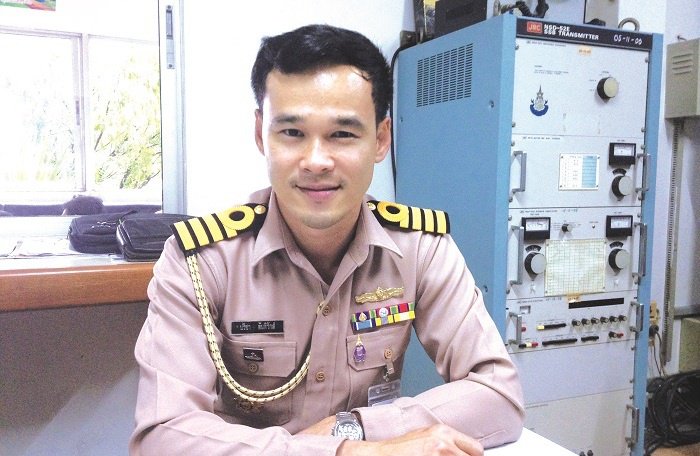Opinion: Fishing for change

Capt Preecha Tuntiruk, 41, of the Third Naval Area Command is head of Phuket’s Port In-Port Out (PIPO) Center. Originally from Samut Songkhram, Capt Preecha graduated from the Royal Thai Naval Academy in 1997.
Here, he talks about why PIPO is necessary in Phuket and what role it takes in fighting the battle against illegal, unreported, and unregulated fishing vessels.
PHUKET: The Port In-Port Out (PIPO) Center, where fishing vessels weighing more than 30 gross tonnes must come to report their arrival and departure from Phuket, as well as other details of their activities, is just one piece in the puzzle of fighting illegal, unreported, and unregulated (IUU) vessels.
There are many other measures and departments needed to take care of the issue. We are just one of them.
What seems to be the biggest problem of late, is that many fishing vessels are disobeying the law, although some could be going out to fish without being aware of the law because no one is enforcing it. If officers do not strictly enforce the law, illegal fishing will continue.
However, the PIPO campaign, recently launched by Prime Minister Gen Prayut Chan-o-cha, can help to combat IUU fishing in Thai waters.
There are about 120 fishing boats that weigh more than 30 tonnes registered in Phuket. A total of about 200 legally registered fishing boats are operating here, including those registered elsewhere.
I think more than 80 per cent of Phuket’s fishing boats are able to operate legally now, while the rest are working on becoming legal. We have no choice but to allow only legal boats to operate.
To eliminate IUU vessels from our waters, we need to work closely with other relevant departments to maintain control over many aspects of the industry, such as the total number of boats and how many can operate in a certain area.
In these cases, we need to work with the Department of Fisheries to determine whether or not fishing in a certain area is allowed, and to ensure that the environment is being preserved and protected. This is essential to maintaining sustainable fishing practices.
We must work together to move forward the nation’s strategy to take down IUU fishing and protect the environment.
We must keep on record what each fishing boat is doing; when they come and leave, how much fish they have caught, who the captain is, how many crew are on-board, and more.
We will add this information to a system that can be accessed by all relevant authorities throughout Thailand. If a fishing boat leaves Phuket and goes to Ranong, Ranong authorities will already have all the information recorded about the boat and its crew, cargo and activities.
If something does not match up, the boat will be seized and an investigation will start.
Once all the boats are in the system, there will be no mistaking what is going on and illegal operations will be caught. The wrongdoers behind them will be arrested.
This process will take time. All legal things take time. Some parts of the process are beyond our authority and have to be sent to our superiors.
I know that Phuket fishermen probably complain about PIPO. However, they have been fully co-operating with our officers.
These new regulations are forcing some fishermen – many of whom have been doing this for decades – to change their behavior. They have gotten used to fishing without reporting anything to officers. This has to change.
— Chutharat Plerin
Latest Thailand News
Follow The Thaiger on Google News:


























